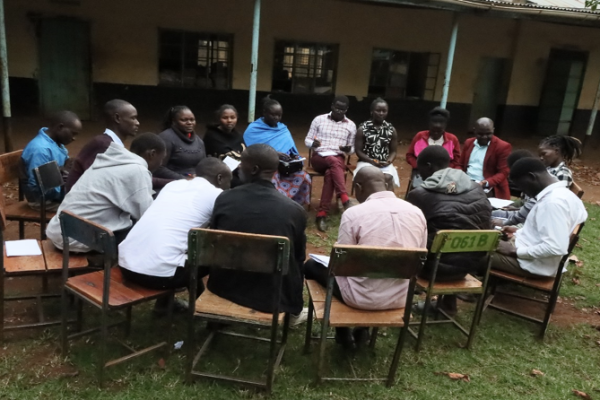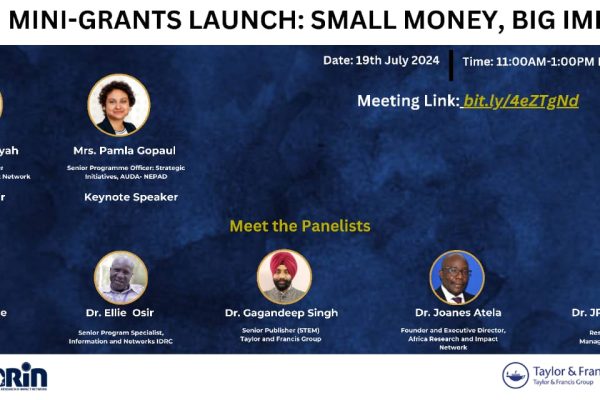By: Edna Kowenje, Charles Tonui , Florence Onyango
High-quality evidence plays a critical role in shaping effective public policies. These policies, in turn, directly impact the accessibility of essential public services and ultimately, the well-being of citizens[1]. Evidence, in this context, refers to factual information that supports a claim or proposition. When applied to policymaking, evidence-informed policymaking (EIP) is the practice of using high-quality research and data to guide policy decisions. This approach is crucial for crafting effective policies that deliver essential services and improve lives.
However, despite the presence of donor-funded research in Africa’s development space, the generation, use, and uptake of evidence in policymaking processes remains limited. This limited uptake is further compounded by the lack of widespread evaluation of public policies to assess the actual use of evidence, particularly by governments themselves. Donor-driven evaluations, while valuable, do not necessarily reflect the specific needs and priorities of African governments. Additionally, limited domestic research funding and a lack of concrete co-production of relevant evidence within Africa create further obstacles.
While African countries have made strides in establishing national planning, monitoring, and evaluation (M&E) systems to assess the effectiveness of public policies there is still a gap between the availability of evidence and its utilization in policymaking[2]. This disconnect stems from a lack of collaboration between the research community and policymakers. Researchers often focus on evidence production that is not necessarily formatted or communicated in a way that informs policy decisions. This highlights the need for better knowledge translation, which involves bridging the gap between research and policy by making research findings accessible and actionable for policymakers[3].
Despite growing recognition of evidence-informed policymaking (EIP), several significant hurdles hinder its widespread adoption in Africa:
Limited Access to Quality Evidence: African policymakers often face a dearth of quality, timely, and relevant evidence to inform their decisions. This stems from inadequate data collection systems and research findings that fail to address their specific needs and contexts. Local data collection efforts might be fragmented, and infrastructure limitations hinder timely access to quality data. Additionally, insufficient funding for data collection and analysis further restricts the availability of relevant evidence for various policy sectors across Africa.
Policymaker Skill Gaps: Policymakers themselves in some instances struggle with limited skills and knowledge to effectively find, synthesize, and apply available evidence. This challenge is compounded by high policy turnover rates, where leaders prioritize meeting immediate public demands within short election cycles, often neglecting expertise in EIP. Furthermore, election-based popularity contests might favour charisma over competence in evidence-based policymaking for specific sectors. Complex issues with ongoing scientific research can be exploited by candidates who cherry-pick evidence or downplay scientific consensus to fit their agenda. An example of this is the repeated implementation of emergency food aid and drought relief programs during election periods, rather than investing in sustainable agricultural practices and climate-resilient infrastructure. Politicians may emphasize the immediate relief provided by such programs to gain public favour while neglecting the long-term benefits of evidence-based climate adaptation strategies. This approach can lead to a cycle of reactive, short-term solutions rather than proactive, sustainable policies grounded in scientific evidence.
Weak Organizational Capacity: Many government agencies in Africa lack the robust infrastructure and policy frameworks necessary to support the regular generation and use of evidence for policymaking. The stark reality of this limitation was exposed during the recent COVID-19 pandemic. The disjointed responses across various sectors, from education to healthcare and economic recovery, highlighted the ineffectiveness of many public organizations in generating timely, high-quality, and accessible evidence. Fragmented healthcare systems and poor data coordination between different agencies further hampered effective responses. For example, the initial response to COVID-19 in many African countries suffered due to weak organizational capacity, hindering the implementation of coordinated public health measures and economic stimulus packages
Language Barriers and Knowledge Translation: The technical language of research reports and Africa’s bilingual nature (English and French) create significant hurdles in evidence-based policymaking. Policymakers often struggle to comprehend complex scientific documents, leading to misinterpretations and ineffective policies. Additionally, limited resources for translating essential documents delay the dissemination of critical information. This challenge was evident during the Ebola outbreak when crucial health guidelines were not promptly translated, hindering a unified response. The language barrier also hampers peer-to-peer knowledge sharing between Anglophone and Francophone nations, resulting in missed opportunities for regional collaboration in sectors like education and public health.
To address these issues, investing in high-quality translation services and developing bilingual resources is essential. Governments and international organizations should ensure that important research and policy documents are available in both English and French to facilitate better understanding and application. Promoting multilingualism in education and training programs can help build a workforce capable of operating across linguistic barriers. Leveraging technology, such as machine translation and multilingual databases, can also streamline the knowledge translation process, enabling more effective communication and collaboration across the continent.
Limited Intermediaries: A critical missing link in the EIP chain is the shortage of “knowledge translators.” These individuals or organizations play a crucial role in bridging the gap between research and policy by transforming complex research findings into clear, concise, and actionable information for policymakers. Without knowledge translators, the process of interpreting often-dense scientific data and synthesizing it into practical policy recommendations becomes a significant challenge. This lack of collaboration between researchers and policymakers can hinder the production of relevant evidence tailored to specific African contexts. Additionally, it can impede the collective interpretation of available data, potentially overlooking valuable insights that could be gleaned from combining findings from different research studies. The absence of skilled knowledge translators in public health, for example, can lead to ineffective responses to health crises like COVID-19. As witnessed during the pandemic, many countries struggled to translate rapidly evolving scientific research into timely and effective public health policies.
The Learning Together to Advance Evidence and Equity in Policymaking to Achieve the Sustainable Development Goals (LEEPS) project funded by Canada’s International Development Research Centre (IDRC), is a significant step towards strengthening the knowledge foundation for policymakers across Sub-Saharan Africa.
LEEPS goes beyond simply providing evidence; it actively promotes the uptake and utilisation of evidence in policymaking processes, with a particular focus on achieving the Sustainable Development Goals (SDGs). The project champions equitable and gender-inclusive policy approaches. This ensures that evidence-based solutions address the diverse needs and experiences of all citizens, fostering more sustainable and just development outcomes. The initial focus areas for LEEPS are:
Reproductive Health: LEEPS supports the development and implementation of evidence-based policies that improve access to quality reproductive healthcare services for all, particularly women and marginalized groups.
Clean Energy Transition: The project fosters the shift towards low-carbon economies in low- and middle-income Sub-Saharan African countries. This includes supporting the development of evidence-based policies that promote renewable energy, energy efficiency, and a just transition for affected communities.
LEEPS’ long-term vision extends beyond these initial areas. The project aims to expand the use of evidence-based, equitable, and gender-inclusive policymaking across all development sectors in Africa. By strengthening the knowledge ecosystem and promoting collaboration between researchers, policymakers, and civil society, LEEPS aims to empower African countries to tackle their most pressing challenges and build a brighter future for all.
LEEPS is not a solitary effort. It is jointly implemented by the Africa Research and Impact Network (ARIN), the African Institute for Development Policy (AfIDEP), and other key partners across Africa. This collaborative approach ensures that the project benefits from a wider range of expertise and perspectives, ultimately leading to a more impactful and sustainable contribution to Africa’s development journey.
ARIN plays a central role in strengthening Africa’s knowledge ecosystem and promoting the adoption of evidence-based policymaking (EIP) practices. ARIN collaborates strategically with LEEPS partners to design and implement effective knowledge translation (KT) strategies and tools. This capacity-building focus aims to support the institutionalization of EIP within partner countries, ensuring that EIP becomes a core component of policy development processes.
In collaboration with AFIDEP, ARIN has demonstrably advanced EIP in Africa by training close to 45 young policymakers, academics, and practitioners. Notably, around 20 graduates of these EIP programs are currently undergoing mentorship to develop focused EIP briefs. This targeted approach equips participants with the skills and knowledge to translate research findings into actionable evidence for policymakers.
ARIN goes beyond simply building EIP capacity. They prioritize integrating considerations of gender, equity, diversity, and inclusion (GEDI) into the core of EIP practices. This ensures that evidence-based policies address the needs of all citizens, fostering more equitable and sustainable development outcomes. ARIN) spearheads several initiatives to share knowledge and build a lasting legacy for Evidence-Informed Policymaking (EIP) in Africa.
The EIP Institutionalization Webinars provide a platform for knowledge exchange and capacity building on EIP practices. These webinars bring together policymakers, researchers, and practitioners to discuss best practices and share insights on effective EIP implementation. ARIN’s Tailor-Made Mentorship Program offers focused support to EIP graduates as they develop EIP briefs. This program ensures that graduates have the guidance and resources needed to produce high-quality evidence briefs that can inform policy decisions. Additionally, ARIN is working on a Book Project, which consolidates case studies centered around institutionalizing evidence in policymaking across Africa. This book will serve as a valuable resource for policymakers and practitioners seeking to strengthen EIP in their countries, providing practical examples and lessons learned from various African contexts
The Way Forward: Institutionalizing EIP Across Sectors in Africa
Context-Specific Evidence, Recognizing Africa’s Diversity: Africa’s diverse socioeconomic realities necessitate a shift from a “one-size-fits-all” approach to EIP. Given fragmented research support across the continent, effective EIP requires tailoring evidence-based policymaking to address local needs. By understanding the specific needs, challenges, and resources of individual communities and organizations, policymakers can champion the use and assimilation of evidence in various sectors. Strengthening local knowledge systems to incorporate local knowledge and perspectives is crucial for ensuring that EIP is truly responsive to on-the-ground realities.
Bridging the Research-Policy Divide through Collaboration is Key: Bridging the gap between researchers and policymakers is essential for successful EIP institutionalization across Africa. Policymakers operate within established governance systems that need to integrate research more effectively. Fortunately, there are emerging best practices to replicate and improve upon. For instance, research directorates within ministries and parliaments (such as the Parliament of Kenya) offer a promising platform for embedding research and EIP practices within national and sectoral policymaking.
This collaboration benefits both parties. Researchers gain access to relevant data and the opportunity to co-produce valuable evidence that directly meets policymakers’ needs. Policymakers, in turn, gain a clearer understanding of their research needs and priorities through open communication and trust-building. This collaborative approach fosters the co-production of relevant research agendas, leading to the generation of critical data and information to inform analysis, evidence creation, and the deployment of effective EIP tools and strategies.
The path toward evidence-informed policymaking (EIP) in Africa is one marked by progress and immense promise. While challenges persist, African countries are actively laying the groundwork for a future where data-driven decisions become the norm, leading to improved outcomes for all citizens. Initiatives like the LEEPS project and the collaborative efforts of ARIN, AFIDEP, and their partners demonstrate a strong commitment to strengthening Africa’s knowledge ecosystem. By fostering collaboration, addressing knowledge gaps, and prioritizing context-specific evidence, Africa can harness the power of EIP to tackle its most pressing challenges and build a more sustainable and equitable future.


